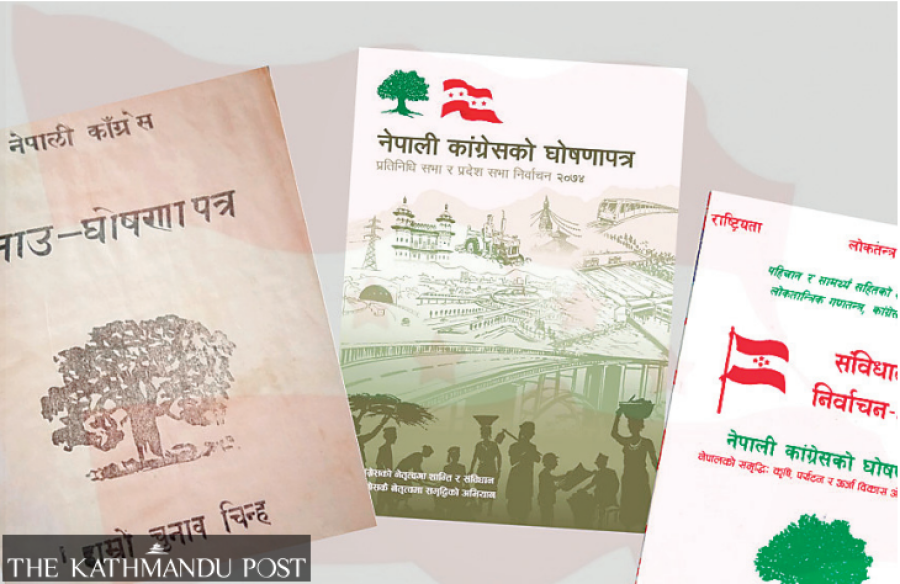Politics
Nepali Congress seeks departure in manifesto for November elections
The party’s blueprint for national development will address issues of unemployment, social justice, digitalisation, information technology and economic growth.
Anil Giri
As federal and provincial elections are approaching fast, political parties are busy preparing their election manifestos.
In this regard, the Nepali Congress seems to be the frontrunner with the party’s central working committee on Friday approving the preliminary draft of the manifesto.
The draft incorporates the inputs received from party leaders and members of the central work execution committee, said Jeevan Pariyar, a joint general secretary of the party.
Party General Secretary Bishwa Prakash Sharma leads a team of experts and party members tasked with preparing the manifesto that will be released soon after incorporating more suggestions from key stakeholders.
The main pivot of the manifesto, Pariyar said, is the failures and wrongdoings of the KP Sharma Oli-led government.
“Oli dissolved the House of Representatives twice and tried to derail the democratic process,” said Pariyar. “We will tell the people how he assaulted democracy and democratic institutions and failed to govern the country properly despite being one of Nepal’s strongest prime ministers.”
Safeguarding the constitution, and fostering democracy and promoting good governance are the party’s major campaign agendas.
The motto of the manifesto would be preparing the roadmap for prosperous Nepal and economic development, said a leader involved in the task.
The Nepali Congress will raise the issue of economic good- governance, address the aspirations of the youth, promote entrepreneurship and come up with a clear roadmap for national development over five years. The manifesto will also derive some elements from that for the local elections held in May.
The manifesto focuses on seven key areas, said Swarnim Wagle, a former vice-chairman of the National Planning Commission, who is a member of the drafting team. The team has recommended a template for broader economic development, social justice and foreign policy based on national sovereignty and equality.
“The manifesto will touch upon the vision of transforming Nepal under a broader framework of democracy, liberal economic system, social justice and cultural development,” said Wagle. “Some emerging and pressing issues like climate change and utilisation of natural resources will be other key features of the manifesto.”
According to taskforce members, on the political front, the manifesto highlights the progress made in the three decades since the restoration of democracy. Besides showcasing the achievements of the governments led by the Congress, the document will also suggest new policies and programmes for the next five years.
“We are planning to make the manifesto public within a week,” said Govinda Raj Pokharel, another former vice-chairman of the National Planning Commission, who is also a member of the drafting committee.
“Employment generation is a key issue we have prioritised in the manifesto. Digitalisation and information and communication and entrepreneurship will also be given priority,” said Pokharel.
In the past, Nepali Congress focussed on socialism, issues of farmers, landless people, unemployment and on how to increase economic growth. “Drastic changes are taking place in domestic as well as external sectors,” said Pokharel.
“Our society, economy and politics are facing new challenges. So we have decided to make some departures from previous manifestos and set a new direction in this document.”
Other Congress leaders involved in the process said they will make the document more realistic than the previous ones, which often were dubbed “bundles of dreams, ideas and unfulfilled promises”.
“We will focus on overall development of the marginalised communities and vulnerable people; on social justice, equality and identity,” said Arjun Narsingh KC, a central committee member.
“We believe that the horizon of social security and social justice should be broadened to serve the marginalised and underprivileged communities better.”
According to him, the drafting team is looking into ideas for transforming the country economically, socially and politically during the next tenure of Parliament.
“We need a new development model to suit the changed context. We have urged the committee to come up with ideas accordingly,” said KC.




 8.22°C Kathmandu
8.22°C Kathmandu















